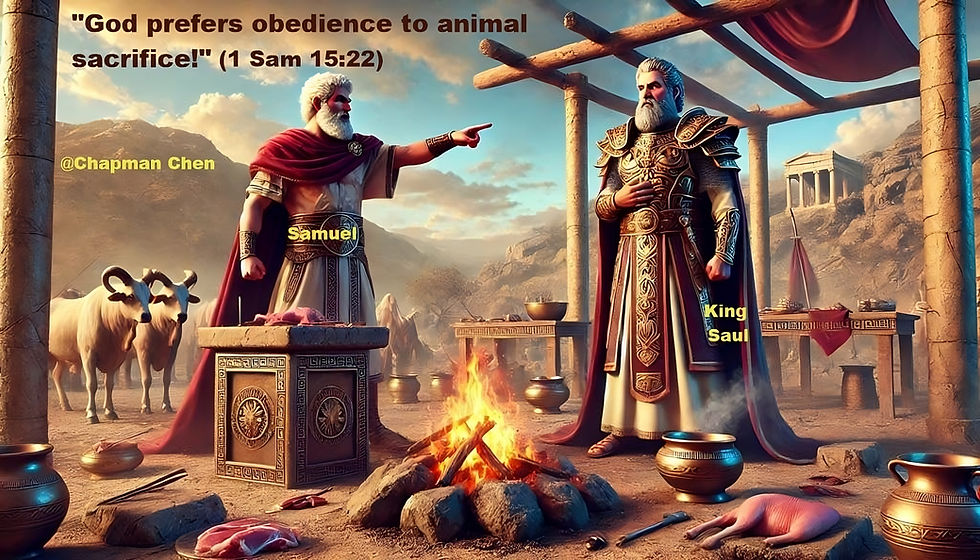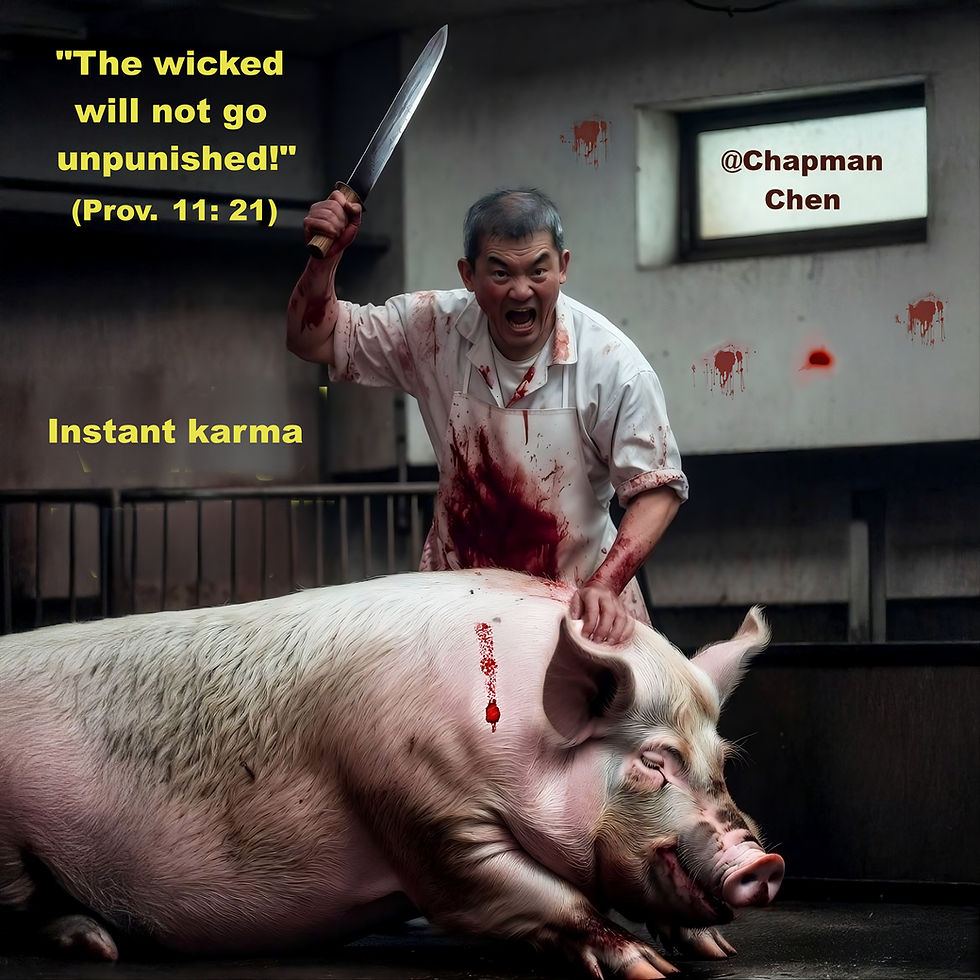Is God Anti-Animal Sacrifice, or Is He Genocidal? By Dr. Chapman Chen
- Chapman Chen

- Jul 30, 2025
- 4 min read
Updated: Aug 25, 2025

“Has the Lord as great delight in burnt offerings and sacrifices, as in obeying the voice of the Lord? Behold, to obey is better than sacrifice, and to listen than the fat of rams.” (1 Samuel 15:22, ESV)
This biblical passage from the prophet Samuel suggests that God prefers obedience —understood as moral integrity and compassion—over the sacrifice of animals to satisfy human lust. This principle is echoed by five other major prophets—Isaiah, Amos, Micah, Jeremiah, and Hosea—each of whom sharply rebukes ritual animal sacrifice in favour of ethical living and compassion:
1. Five Vegan Prophets Opposing Animal Sacrifice
Isaiah 1:11: “I have had enough of burnt offerings of rams and the fat of well-fed beasts… I do not delight in the blood of bulls, or of lambs, or of goats.”
Amos 5:21–22: “I hate, I despise your feasts… Even though you offer me your burnt offerings…I will not accept them.”
Micah 6:6–8: “Will the Lord be pleased with thousands of rams…? He has told you, O man, what is good… to do justice, and to love kindness, and to walk humbly with your God.”
Jeremiah 7:22–23: “For in the day that I brought them out of the land of Egypt, I did not speak to your fathers or command them concerning burnt offerings and sacrifices.”
Hosea 6:6: “For I desire steadfast love and not sacrifice, the knowledge of God rather than burnt offerings.”
2. Jesus the Vegan Christ
Their legacy of compassion is inherited by Jesus, who directly quotes Hosea when declaring: “I desire compassion, not sacrifice!” (Hosea 6:6 / Matthew 9:13). Jesus didn’t just preach this ethic—He lived it. In liberating the sacrificial animals from the Temple, in calling the Temple-turned-butcher-shop ‘a den of murderers’ (Mark 11:17), He debunked its fraudulent, violent nature, and disrupted the lucrative income stream of the high priests and scribes, who immediately afterward plotted to have Him killed (Mark 11:18), eventually leading to His arrest, trial, and crucifixion (cf. Akers 2000, 113–134).
3. A Genocidal Command?
However, the broader context of 1 Samuel 15 is deeply troubling. It presents what appears to be a genocidal command issued by God: to kill every sentient being in Amalek, including men, women, infants, and animals. Samuel rebukes King Saul not exactly for sacrificing innocent animals, but for delaying their slaughter until the sacrificial moment.
4. The Litmus Test for the Validity of Any Biblical Verse
According to Norm Phelps (2002), the ultimate test for evaluating any biblical verse or passage that appears to condone animal abuse or flesh-eating is whether it aligns with the two commandments declared by Jesus: Love God with all your heart and Love your neighbour as yourself. As God already has everything, He does not need our nurture or gifts. The only practicable way to express love for God is by loving the sentient beings He created.
Therefore, such an atrocious order as found in 1 Samuel 15:3 cannot be attributed to an all-loving God. Rather, it must have been an interpolation added by “the lying pen of the scribes” (Jeremiah 8:8) (cf. Tabor 2024). The genocidal passage likely reflects a form of nationalist propaganda, inserted by political or religious authorities to rally the morale of the Israelites against their enemy states.
5. Nationalistic/Political/Militaristic Agendas
Indeed, many biblical scholars and theologians agree that violent or genocidal commands in the Hebrew Bible often reflect nationalistic, political, or militaristic agendas—likely inserted or shaped by scribes aligned with the royal or priestly class. For example, Walter Brueggemann (1990), in First and Second Samuel, observes that 1 Samuel 15’s harsh theology reflects “an intense ideological agenda” concerning kingship, obedience, and national identity; Thomas Römer (2015), in The Invention of God, discusses how Deuteronomistic redactors retrospectively inserted violent divine commands to create theological support for monarchy and land control; John J. Collins (2005), in The Bible After Babel: Historical Criticism in a Postmodern Age, argues that “many of the commands to destroy foreign peoples reflect a retrospective theological justification of territorial claims.”; Mark Brett (2008), in Decolonizing God: The Bible in the Tides of Empire, explores how biblical texts were edited to support nationalist and exclusionary policies during Persian-period Judah; Susan Niditch (1993), in War in the Hebrew Bible, analyses how “sacred violence” functioned to sanctify military ideology and how biblical authors framed war to serve national agendas.
6. Conclusion
The genocide ordered in 1 Samuel 15:3—killing infants and animals alike—bears the marks of nationalist propaganda, not divine compassion. It likely reflects a later editorial addition by scribes seeking to justify war and consolidate power, echoing the prophetic warning of Jeremiah 8:8. By contrast, the words of Samuel in verses 22–23 ring with enduring truth: inner obedience is better than sacrifice. When read through the lens of the prophets and Christ, these verses can be reclaimed to support a vegan theology that rejects all bloodshed, whether of humans or animals, as contrary to the will of God. #VeganGod #VeganChrist #VeganTheology #VeganChurch





Comments